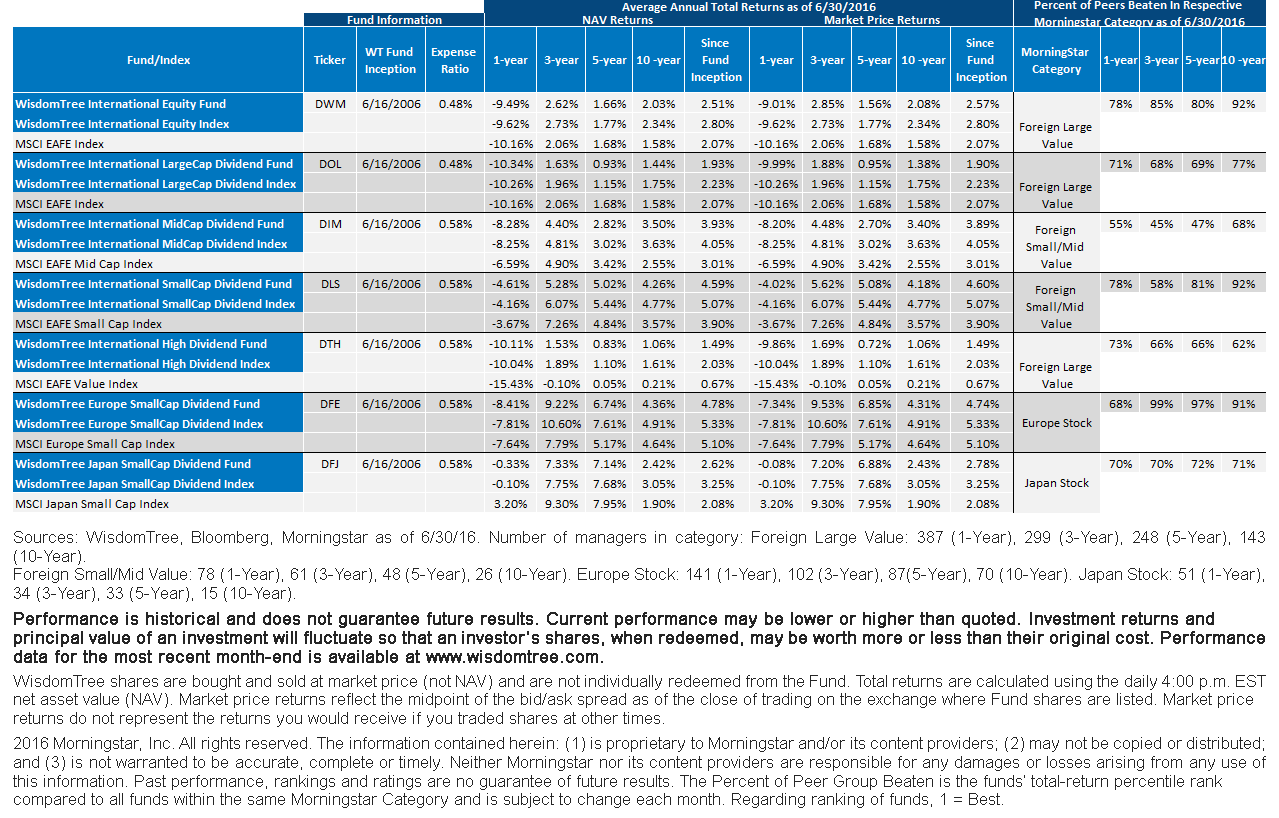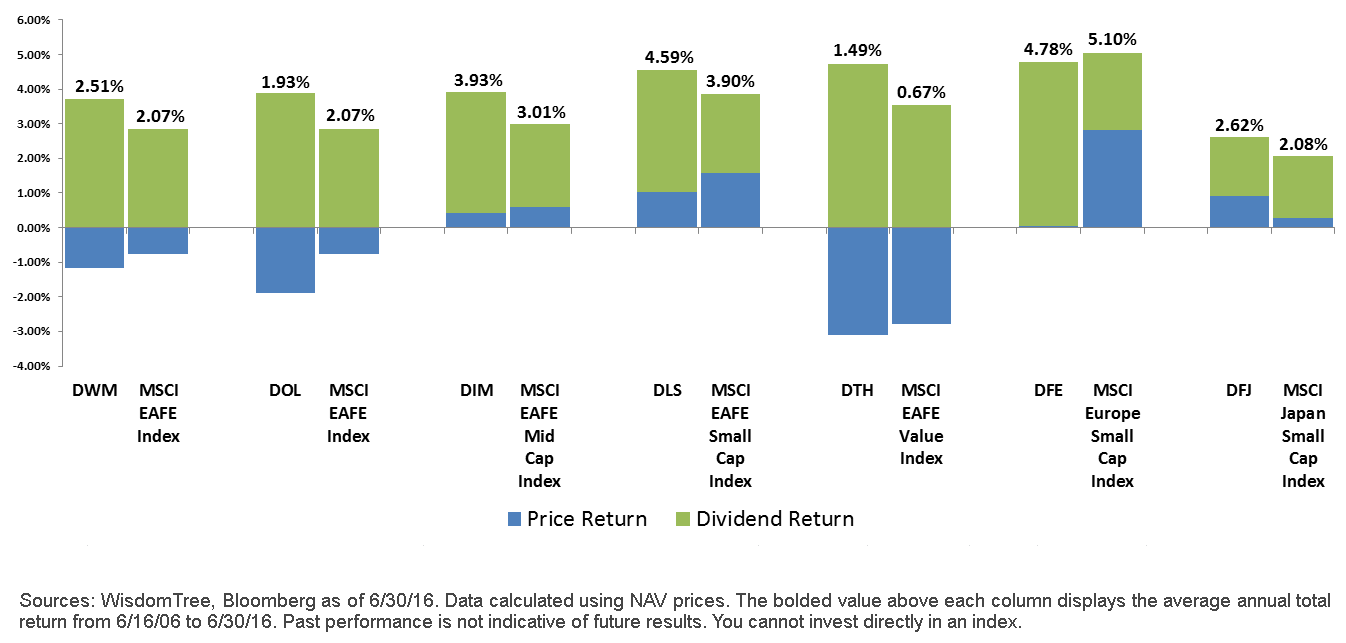Is There a Better Way to Own Developed World Stocks?


 For definitions of terms in the chart, visit our glossary.
First, in every instance, WisdomTree’s international dividend-weighted Indexes beat their comparable cap-weighted peers over the past decade. WisdomTree’s broadest Index, the WisdomTree International Equity Index, outperformed the MSCI EAFE Index by 76 basis point (bps) on an annualized basis over the last decade. Both the WisdomTree International Equity Index and the WisdomTree International High Dividend Index beat their cap-weighted benchmark in each and every period displayed. After fees, expenses and transactions costs, five of WisdomTree’s seven developed-world ETFs generated higher returns over the past 10 years than did their comparable cap-weighted benchmark. Similar to what we saw in the U.S., the highest absolute performance for the 10-year period came in the smaller-size segment of the market. The WisdomTree Europe SmallCap Dividend Fund (DFE) averaged 4.4% on an annualized basis over the decade, while the WisdomTree International SmallCap Dividend Fund (DLS) averaged 4.3%. And over the past 10 years, the WisdomTree International Equity Fund (DWM), DLS and DFE all outperformed more than 90% of their peer groups.
The other interesting takeaway from examining these seven Funds is how important the dividend portion was to the total returns of the Funds. In the large-cap portion of the developed world, where price returns were negative, dividends paid were responsible for all of the gains over the period.
Deconstruction of Total Return, WisdomTree International Dividend-Weighted ETFs vs. Cap-Weighted Indexes, June 16, 2006 – June 30, 2016
For definitions of terms in the chart, visit our glossary.
First, in every instance, WisdomTree’s international dividend-weighted Indexes beat their comparable cap-weighted peers over the past decade. WisdomTree’s broadest Index, the WisdomTree International Equity Index, outperformed the MSCI EAFE Index by 76 basis point (bps) on an annualized basis over the last decade. Both the WisdomTree International Equity Index and the WisdomTree International High Dividend Index beat their cap-weighted benchmark in each and every period displayed. After fees, expenses and transactions costs, five of WisdomTree’s seven developed-world ETFs generated higher returns over the past 10 years than did their comparable cap-weighted benchmark. Similar to what we saw in the U.S., the highest absolute performance for the 10-year period came in the smaller-size segment of the market. The WisdomTree Europe SmallCap Dividend Fund (DFE) averaged 4.4% on an annualized basis over the decade, while the WisdomTree International SmallCap Dividend Fund (DLS) averaged 4.3%. And over the past 10 years, the WisdomTree International Equity Fund (DWM), DLS and DFE all outperformed more than 90% of their peer groups.
The other interesting takeaway from examining these seven Funds is how important the dividend portion was to the total returns of the Funds. In the large-cap portion of the developed world, where price returns were negative, dividends paid were responsible for all of the gains over the period.
Deconstruction of Total Return, WisdomTree International Dividend-Weighted ETFs vs. Cap-Weighted Indexes, June 16, 2006 – June 30, 2016
 Conclusion
At a time when many investors are flocking to dividend-paying stocks for a variety of reasons—because they want yield, or because they want lower-correlating stocks or stocks that have exhibited strong recent price momentum—it is worth noting that there is another way to use dividend-paying stocks in one’s portfolio. As we have shown, over longer-term holding periods, owning the dividend-paying portion of the market can return more dividend income to investors and generate higher total returns than comparable cap-weighted indexes. With WisdomTree, because we typically select companies based on their market cap and then weight by the dividends they pay, investors can use dividend-weighted ETFs in the core of their portfolios to gain broad access to asset classes around the world as part of globally diversified portfolios.
Conclusion
At a time when many investors are flocking to dividend-paying stocks for a variety of reasons—because they want yield, or because they want lower-correlating stocks or stocks that have exhibited strong recent price momentum—it is worth noting that there is another way to use dividend-paying stocks in one’s portfolio. As we have shown, over longer-term holding periods, owning the dividend-paying portion of the market can return more dividend income to investors and generate higher total returns than comparable cap-weighted indexes. With WisdomTree, because we typically select companies based on their market cap and then weight by the dividends they pay, investors can use dividend-weighted ETFs in the core of their portfolios to gain broad access to asset classes around the world as part of globally diversified portfolios.
Important Risks Related to this Article
There are risks associated with investing, including possible loss of principal. Foreign investing involves special risks, such as risk of loss from currency fluctuation or political or economic uncertainty. Funds focusing their investments on certain sectors and/or smaller companies increase their vulnerability to any single economic or regulatory development.
Some of the Funds invest in derivatives in seeking to obtain a dynamic currency hedge exposure. Derivative investments can be volatile, and these investments may be less liquid than other securities, and more sensitive to the effects of varied economic conditions. Derivatives used by the Funds may not perform as intended. A Fund that has exposure to one or more sectors may be more vulnerable to any single economic or regulatory development. This may result in greater share price volatility. The composition of each Index underlying each Fund is heavily dependent on quantitative models and data from one or more third parties, and the Index may not perform as intended. The Funds invest in the securities included in, or representative of their Index regardless of their investment merit, and the Funds do not attempt to outperform their Indexes or take defensive positions in declining markets. Please read each Fund’s prospectus for specific details regarding each Fund’s risk profile.


